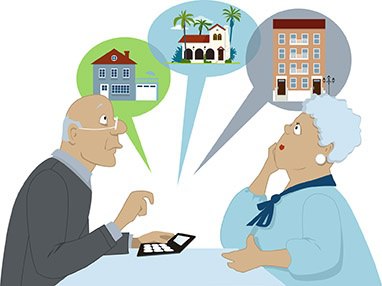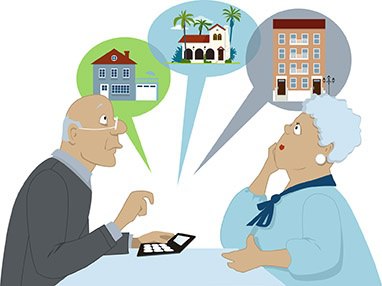Housing Considerations for Where to Live in Retirement
October 7th, 2015 | 3 min. read

 One of the biggest decisions you’ll make as you prepare to retire is where you’ll live. After all, as your lifestyle changes, your housing needs are likely to change too. There are more than financial considerations involved. You also need to think about social and physical elements of your retirement home and its location.
One of the biggest decisions you’ll make as you prepare to retire is where you’ll live. After all, as your lifestyle changes, your housing needs are likely to change too. There are more than financial considerations involved. You also need to think about social and physical elements of your retirement home and its location.
Whether you stay in your family home, downsize or relocate to your favorite vacation getaway, your home will play a key role in living the retirement you’ve always wanted. Here are some important things to keep in mind as you decide where to plant your feet in retirement.
Costs of homeownership
As you evaluate your housing preferences in retirement, consider the maintenance responsibilities and expenses. If you choose to stay in your current home, will you be able to dedicate the time and energy toward the upkeep? If not, can you afford to hire someone to help?
“Downsizing” to a smaller home, condo or townhome can be less expensive and more manageable. In the case of a condo or townhome, a lot of the maintenance is done for you. Plus, you can expect lower utilities in a smaller space.
You also have to take into account unexpected costs, such as structural damage, broken appliances, etc. An Employee Benefit Research Institute survey found only half of retired Americans said they “definitely could” afford a $2,000 unexpected expense.
State income taxes
Needless to say, taxes can be a drag on your retirement savings. That’s why state income taxes should be a consideration as you choose which state to live in. Taxes differ from state to state. If you live in Florida or Texas, for example, you’re fortunate to pay no income tax. Additionally, each state has its own sales tax, which can contribute to higher costs of living. In some states, taxes even apply to your Social Security benefit.
Property taxes and insurance
Furthermore, don’t overlook property taxes. While property taxes generally rise and fall based on the size and value of your home, they are also susceptible to the whims of local politics. Since collected property taxes are used to fund government programs, property tax rates are often targeted by municipalities for generating additional revenue.
Home insurance rates can also rise at any time and differ significantly based on location. Homes in coastal areas, for example, are usually more expensive to insure. Keep that in mind when considering a dream home with ocean front property.
Physical dimensions
As you age, your physical needs and abilities may change. Therefore, take into consideration how your home can accommodate those changes. Will you be able to get around easily, such as up or down stairs? Can you afford any remodeling such as ramps and accessible bathrooms, if necessary? Purchasing a home that provides greater accessibility earlier in life may save you a lot of money later.
Costs of living
Your ZIP code can have a negative impact on your finances. Richer communities may have higher taxes and costs of living, which can reduce your limited financial resources. A wealthy neighborhood may also make you feel pressured to maintain appearances to “keep up with the Joneses.”
Health and well-being
Often, the key factor when choosing where to live in retirement is proximity to the people you love and/or things you love to do. Social interaction can help create a healthy and fulfilling retirement. It’s why many retirees follow their children. And, it’s why many retirees are attracted to college towns, which offer many cultural and educational opportunities as well as top-notch medical facilities.
Living near family, friends and cherished activities has potential financial benefits, too. For one, you are likely to spend less on travel expenses. Further, family members or friends can offer assistance in times of need. A more active lifestyle can also improve your physical and mental health, reducing the need for expensive medical care.
Reverse mortgage as retirement income
Some retirees might consider staying put to tap their home equity as a source of income in retirement. This is done through a reverse mortgage. The bank pays you each month as you turn part of your home equity into cash. You don’t have to sell the home or take on additional monthly bills. The loan is repaid when you pass away, sell the house or no longer use it as a primary residence.
While a reverse mortgage may sound simple, they are generally very complex and costly. In most cases, it should be used as a last resort, as it can affect your benefit eligibility, lead to higher closing costs and interest rates, and diminish the value of your property. If you feel the need to consider this option, it is important to review all potential costs and preconditions with a financial adviser.
Retirement community housing options
Retirement or assisted-living communities are popular because they can provide many amenities all in one place. Residents can receive continuing medical care, housekeeping services, transportation and more. Although such a living arrangements may meet many of your needs, such communities can also require large down payments and provide less flexibility than owning your own home.
All of these housing considerations can be complex and costly. It’s important you discuss your personal housing needs and desires with a financial adviser. You don’t want to be left working on your home instead of your retirement dreams.
Advance Capital Management is a fee-only RIA serving clients across the country. The Advance Capital Team includes financial advisers, investment managers, client service professionals and more -- all dedicated to helping people pursue their financial goals.
